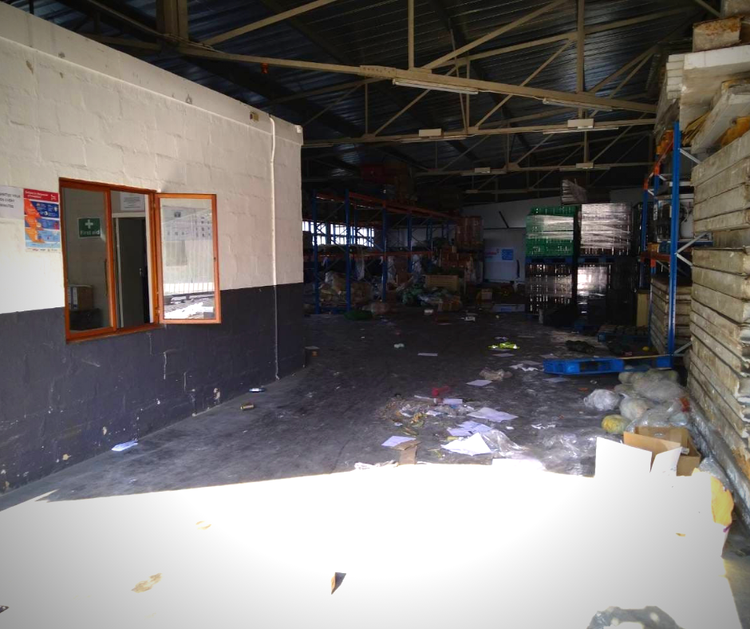Food supply to 675,000 people cut off after Durban food bank ransacked
FoodForward SA closes branches nationwide because of insecurity
The Durban warehouse of food bank FoodForwardSA was ransacked, stopping food supplies to 125,000 people. The organisation has temporarily closed its other branches. Photo: supplied
The Durban warehouse belonging to FoodForward SA was ransacked on Tuesday, prompting the organisation to close all its branches in five cities, leaving some 675,000 people without the food it supplies.
More than 125,000 vulnerable people depend on the food sourced from the Durban warehouse, according to FoodForward SA’s fund development manager, Deidre Adams.
She said looters had taken all the food in the warehouse. “They also vandalised our vehicles and managed to steal one of our eight-ton refrigerated trucks,” said Adams.
“A truck like that costs over a million. These are speciality trucks because they are refrigerated. The infrastructure is also expensive because we need to maintain the cold temperatures since we distribute fresh produce as well.”
For more than a decade, FoodForward SA has been collecting edible surplus food and non-food products from farmers, wholesalers, manufacturers and retailers. These food items are redistributed to registered beneficiary organisations. More than 85% of the beneficiary organisations are involved in skills development and remedial work.
“We serve a network of about 1,200 registered beneficiary organisations around the country and it enables us to feed around 675,000 people daily.
“Our Durban branch serves beneficiaries in KwaZulu-Natal and the Free State.”
Beneficiaries include old age homes, shelters for homeless people, shelters for abused women, facilities for orphans and people with disabilities, centres for at-risk youth, aftercare facilities for children, and healthcare facilities.
Adams said they had not yet estimated the value of the food lost “but we know it’s going to be millions because they took everything.”
“We decided to also close all of our branches, not only the Durban branch, for the rest of the week because of safety issues. So there is now going to be heightened food insecurity amongst all the 675,000 people.”
“This means that vulnerable people are not going to be able to access food.”
Beneficiary organisations visit the FoodForward warehouses once a month for their allocations of perishable and non-perishable food items including canned goods, rice, maize, fruit and vegetables. “They use the food to cook for their beneficiaries,” said Adams.
FoodForward SA has five branches, in Cape Town, Gqeberha, Durban, Johannesburg and Rustenburg. From these branches, food is distributed across all nine provinces: the Cape Town branch covers the Western Cape and Northern Cape; the Durban branch sees to KZN and the Free State; the Johannesburg branch covers Gauteng, Limpopo and Mpumalanga; and the Rustenburg branch covers the North West province.
“The organisations who relied on us are not getting food. That’s the really sad part.” said Adams.
She said the extent of the damages in Durban will only be assessed next week, and a decision will be taken then when to open the other branches.
Next: Declaring a State of Emergency explained
Previous: Fears that some SASSA beneficiaries will not get paid next month
Letters
Dear Editor
I’m with an NGO called CARE4u2.Respite.Outreach. We assist in special needs cases but during this pandemic our requests were increasingly for food assistance.
Reading this article makes me angry and sad at the same time because this will add to the already dire need in our special needs community.
I’ve also just read that some of the SASSA grants will not be able to be accessed because of the destruction of ATMs at malls. Where does this leave the most vulnerable in our communities?
© 2021 GroundUp. This article is licensed under a Creative Commons Attribution-NoDerivatives 4.0 International License.
You may republish this article, so long as you credit the authors and GroundUp, and do not change the text. Please include a link back to the original article.
We put an invisible pixel in the article so that we can count traffic to republishers. All analytics tools are solely on our servers. We do not give our logs to any third party. Logs are deleted after two weeks. We do not use any IP address identifying information except to count regional traffic. We are solely interested in counting hits, not tracking users. If you republish, please do not delete the invisible pixel.



